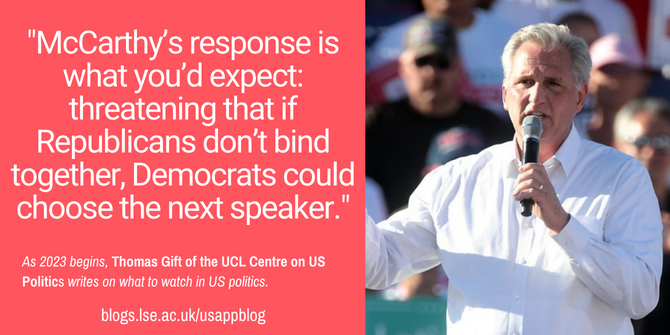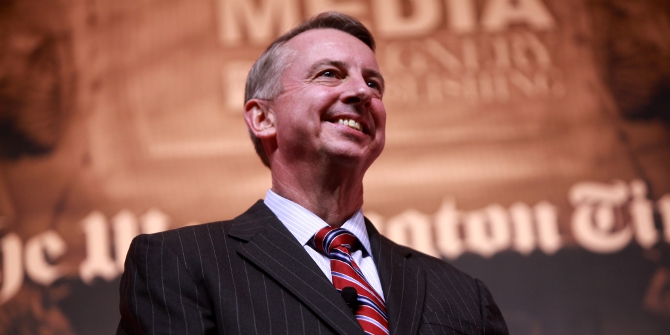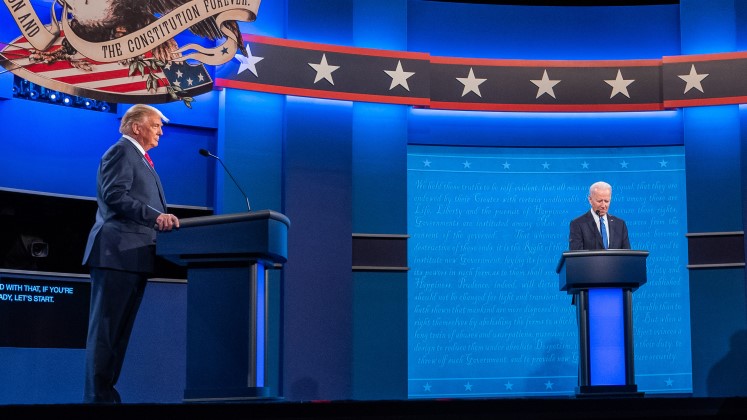 January 2023 has arrived, and a new Congress will be sworn in on Capitol Hill on Tuesday. Although Republicans look to change the narrative in Washington, DC with their newfound majority in the House, many of the same controversies that heated up at the end of 2022 remain. In this Q&A, Thomas Gift discusses some of the key headlines emerging in nation’s capital as the country braces for divided government in the new year.
January 2023 has arrived, and a new Congress will be sworn in on Capitol Hill on Tuesday. Although Republicans look to change the narrative in Washington, DC with their newfound majority in the House, many of the same controversies that heated up at the end of 2022 remain. In this Q&A, Thomas Gift discusses some of the key headlines emerging in nation’s capital as the country braces for divided government in the new year.
What do you make of the battle for the House speakership? Can Kevin McCarthy secure the votes he needs to lead Republicans as expected?
No one envies California Republican Kevin McCarthy right now. His majority in the House is razor thin. So it’s no surprise that locking up the requisite votes for the speakership (a majority of those present and voting) is proving to be a high-wire act. McCarthy needs to strike that elusive balance of appeasing “establishment” Republicans without alienating the Trump wing of the party. In the end, I expect that McCarthy will be named speaker. But in the meantime, pro-Trumpers are using their leverage to extract as many concessions as they can, including making it easier to replace the speaker. Along with that has come some harsh criticism from members of McCarthy’s own party. Virginia Rep. Bob Good, for example, recently called out McCarthy for being part of Washington’s “swamp cartel.” So, it’s getting messy. McCarthy’s response is what you’d expect: threatening that if Republicans don’t bind together, Democrats could choose the next speaker. Reportedly, Trump has been working behind the scenes urging followers not to oppose McCarthy. But for many hardline, populist Republicans, there’s a sense that McCarthy is just too centrist.

“Kevin McCarthy” (CC BY-SA 2.0) by Gage Skidmore
Speaking of the Republican caucus, one of the most widely-covered controversies over the last weeks has been about New York Congressman-elect George Santos. How are Republicans handling him?
George Santos is kind of Washington’s own version of “catch me if you can.” And it is a bizarre story. He’s lied about virtually everything, from where he went to college, to what companies he worked for, to his religion, to even his mother’s death. Santos calls the statements “embellishments.” But these are outright lies by any reasonable definition, and the scale of his fabrications is mind-boggling. Perhaps the worst part is that Santos hasn’t once expressed genuine remorse. Plenty of GOP members, even if they haven’t embraced Santos, haven’t fully repudiated him. And I think the scandal is even more notable because it takes place in Trump’s shadow, against backdrop of the “Big Lie.” Which is to say, facts don’t seem to matter anymore. So far, Kevin McCarthy is taking a “let’s-wait-and-see” approach to the investigation because he wants Santos’s vote for speaker. In the short term, Santos is going to take his seat on Capitol Hill. But what could potentially undo him is if he lied on his financial disclosure forms. Still, Santos hasn’t demonstrated any capacity for shame. So if he does leave, it’ll likely be because he’s forced out, rather than because he voluntarily resigns.
Republicans will spend much of the next two years consumed with investigating Joe Biden. But how do you envision the Department of Justice (DOJ) January 6th probe into Donald Trump unfolding?
The first thing to emphasize is that Attorney General Merrick Garland did appoint a special counsel, Jack Smith, to oversee the Trump investigation. The goal, of course, is to parry criticism about conflicts of interest. But the reality is this: Anything the Justice Department does—whether good or bad for Trump—is going to be spun as political. And ultimately Merrick Garland holds final authority over prosecuting. So it’s a catch-22. If the DOJ doesn’t indict, it will be criticized for treating Trump as special and for putting him above the law. If it does indict, Republicans will cry “witch-hunt.” My prediction is that Trump won’t be indicted, simply because the legal bar for criminality is so high, and the worst-case outcome for the DOJ is taking a shot at Trump and missing. But if Trump is prosecuted, it will unleash a fury of anger from Republicans that Trump will exploit to boost his support. That support won’t just come from dyed-in-the-wool MAGA-types. It will also come from moderate Republicans, who know that if they don’t at least nominally back Trump, they’ll feel his wrath in the next primary.
As Joe Biden braces for investigations, he’ll also soon be expected to make an announcement on a possible 2024 run. How will he approach the decision?
I wouldn’t be surprised if Biden waits till until the eleventh hour to make any announcement on running. If he is all in for 2024, there’s not a huge disadvantage to waiting. And if he’s not running, then he’ll want to delay as long as possible to avoid being a premature “lame duck.” It’s increasingly hard for me to imagine Biden running again, just given his age (he’s currently 80) and legitimate questions about his physical and mental vitality. There’s certainly a sense within the Democratic Party that it’s time for someone younger and for generational change. But at the same time, if you look up and down the Democratic ticket, there’s not a deep bench of potential replacements. Vice President Kamala Harris has lower approval ratings than Biden, so she’s not a clear heir apparent. Transportation Secretary Pete Buttigieg has had enormous trouble courting Black voters. Senator Amy Klobuchar doesn’t excite the liberal base. Senator Elizabeth Warren is far to the left. And many critics see California Governor Gavin Newsom as too smooth and too “Hollywood.” So maybe Biden is right that he’s the best candidate, despite the potential Achilles heel of his age.
Please read our comments policy before commenting.
Note: This article gives the views of the author, and not the position of USAPP – American Politics and Policy, nor the London School of Economics.
Shortened URL for this post: https://bit.ly/3VBKZEx






